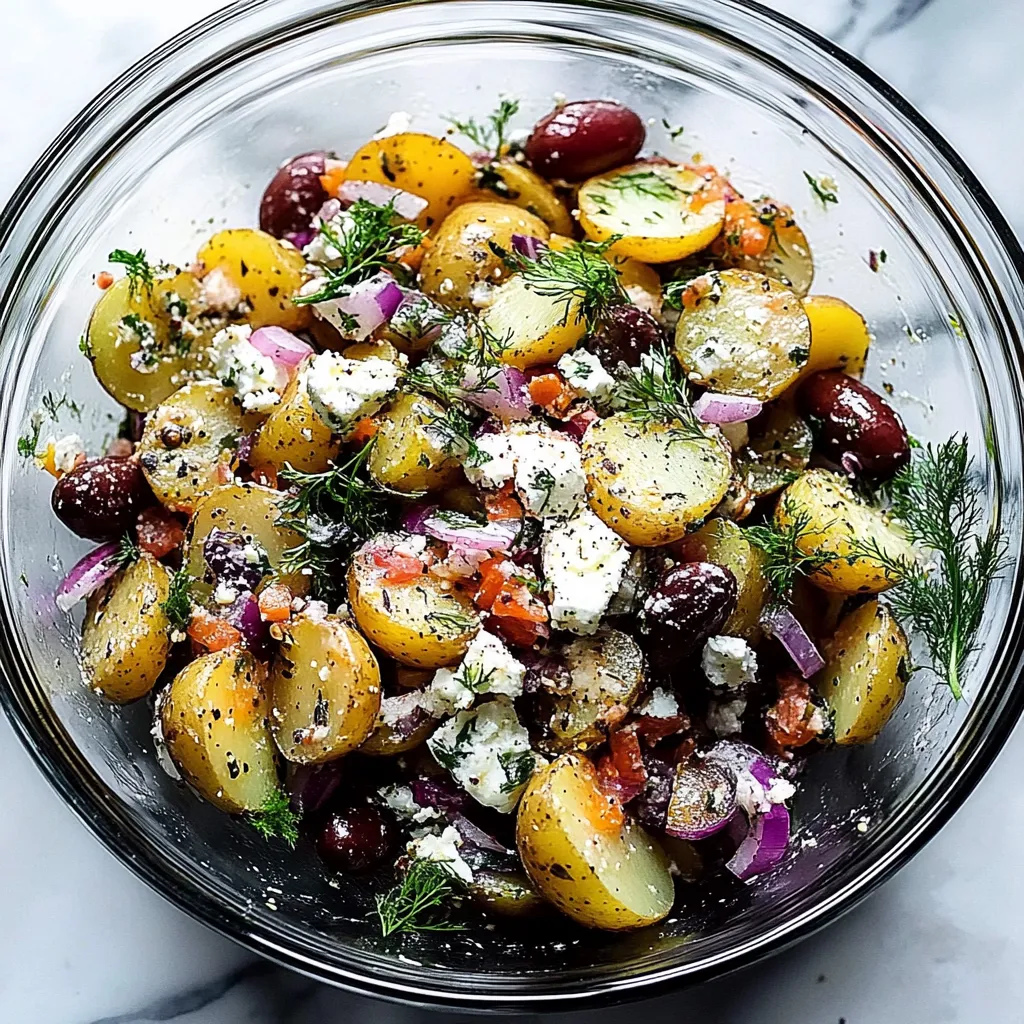 Pin it
Pin it
This tangy Greek potato salad transforms everyday ingredients into a Mediterranean flavor explosion. With its perfect balance of briny, zesty, and herbaceous notes, it's a refreshing alternative to mayonnaise-based versions and brings a taste of Greece to your table any time of year.
I first made this potato salad for a summer gathering, thinking it would be a nice side dish. It ended up stealing the spotlight completely! Now my family requests it for everything from holiday meals to casual weeknight dinners.
Ingredients
- Petite white or red potatoes: Their waxy texture holds up perfectly when boiled and their thin skins add color and nutrients
- Kalamata olives: These provide the distinctive Greek flavor profile with their meaty texture and rich brininess
- Oil-packed sun-dried tomatoes: Look for ones in olive oil for the best concentrated sweet-tart flavor
- Capers: These tiny flavor bombs add saltiness and brightness. Reserve the brine for an extra layer of flavor
- Red onion: Adds a sharp, colorful contrast. Slice them very thinly to prevent overpowering other ingredients
- Fresh dill: The feathery texture and distinctive flavor is quintessentially Greek. Use plenty
- Feta cheese: Opt for authentic Greek feta made from sheep's milk for the creamiest texture and tangiest flavor
- Extra-virgin olive oil: The foundation of the dressing. Use the highest quality you can find
- Red wine vinegar: Provides the acidic punch that balances the richness of the other ingredients
- Garlic, mustard and herbs: Creates the aromatic Mediterranean flavor base that makes this salad special
Step-by-Step Instructions
- Boil the Potatoes:
- Add potatoes to a pot with enough water to cover by one inch. Bring to a boil, add kosher salt, then reduce to a simmer. Cook until tender enough to pierce easily with a fork, about 15 minutes. The salt in the water seasons the potatoes from the inside out.
- Prepare the Dressing:
- While potatoes cook, combine olive oil, red wine vinegar, garlic, dry mustard, oregano, thyme, salt and pepper in a jar with a lid. Shake vigorously until emulsified. Let the flavors meld while you finish the other steps.
- Cut and Season the Warm Potatoes:
- Once potatoes are fork-tender, drain them thoroughly. While still warm but cool enough to handle, cut into halves or bite-sized chunks depending on size. Immediately drizzle with reserved caper brine and toss gently. The warm potatoes will absorb the flavorful brine, seasoning them from within.
- Combine and Dress:
- Add olives, red onion, capers, sun-dried tomatoes, and fresh dill to the potatoes. Pour the dressing over everything and toss gently to combine. Be careful not to mash the potatoes. Taste and adjust seasonings if needed.
- Add the Finishing Touch:
- Sprinkle crumbled feta over the top just before serving. Adding it last preserves its bright white color and distinct texture against the dressed ingredients.
 Pin it
Pin it
The combination of capers and their brine is what makes this recipe truly special. I discovered this technique from my Greek neighbor who insisted that the brine acts as a flavor bridge between the potatoes and the dressing. She was absolutely right, and I've never made potato salad without it since.
Make It Your Own
This recipe welcomes thoughtful variations while maintaining its Greek character. For a protein boost, add chickpeas or white beans. For more vegetables, try adding cucumber chunks or roasted red peppers. Even cherry tomatoes work beautifully in summer when they're at their peak. The fundamental flavor profile remains intact while you adapt it to your preferences or what's available seasonally.
Perfect Pairings
This potato salad pairs wonderfully with grilled meats, especially lamb or chicken souvlaki. It's also substantial enough to serve as a vegetarian main course alongside a simple green salad and crusty bread. For a complete Greek-inspired meal, serve it with spanakopita and a glass of crisp white wine like Assyrtiko. The tangy, briny flavors in the salad complement the richness of other Mediterranean dishes perfectly.
Storage and Make Ahead Tips
This salad actually improves with time as the potatoes absorb the flavorful dressing. You can prepare it up to three days ahead and store in an airtight container in the refrigerator. Just hold back some of the fresh dill and all of the feta to add just before serving for the best presentation. Remove from the refrigerator about 30 minutes before serving to take the chill off and allow the flavors to fully express themselves.
 Pin it
Pin it
This tangy take on traditional potato salad will be the go-to dish at every gathering.
Frequently Asked Questions
- → Can I make this Greek potato salad ahead of time?
Yes, this salad is actually better when made ahead! Preparing it at least an hour before serving allows the potatoes to absorb the dressing and develop more flavor. It keeps well in the refrigerator for 3-4 days, making it perfect for meal prep.
- → What can I substitute for kalamata olives?
If you don't have kalamata olives, you can substitute black olives or green olives. Each will bring a different flavor profile, but will still complement the Mediterranean theme of the dish.
- → Is this potato salad served hot or cold?
This versatile dish can be served warm, at room temperature, or chilled, depending on your preference. It's delicious any way you serve it, making it appropriate for any season.
- → Can I use dried herbs if I don't have fresh dill?
Yes, you can substitute dried dill for fresh, but use about 1/3 the amount (about 2-3 tablespoons) as dried herbs are more concentrated in flavor. Fresh parsley or mint would also work well as alternatives.
- → How can I make this potato salad dairy-free?
To make this dairy-free, simply omit the feta cheese or replace it with a dairy-free feta alternative. The salad is still flavorful without cheese, as it gets plenty of flavor from the olives, capers, sun-dried tomatoes, and zesty dressing.
- → What type of potatoes work best for this salad?
Petite white or red potatoes are ideal because they hold their shape well after cooking and have a creamy texture. Yukon Gold potatoes would also work nicely as a substitute.
